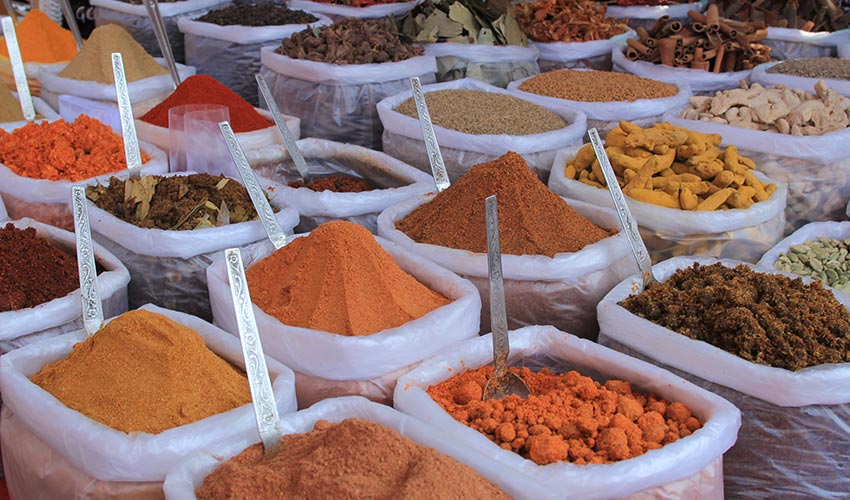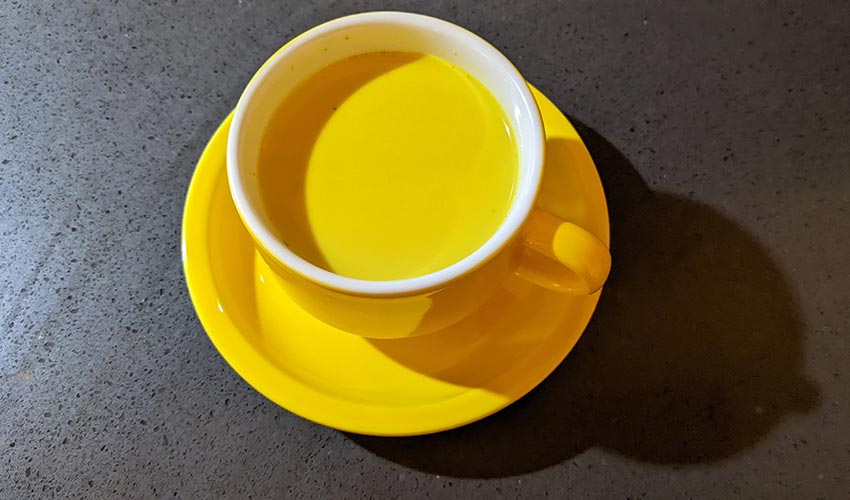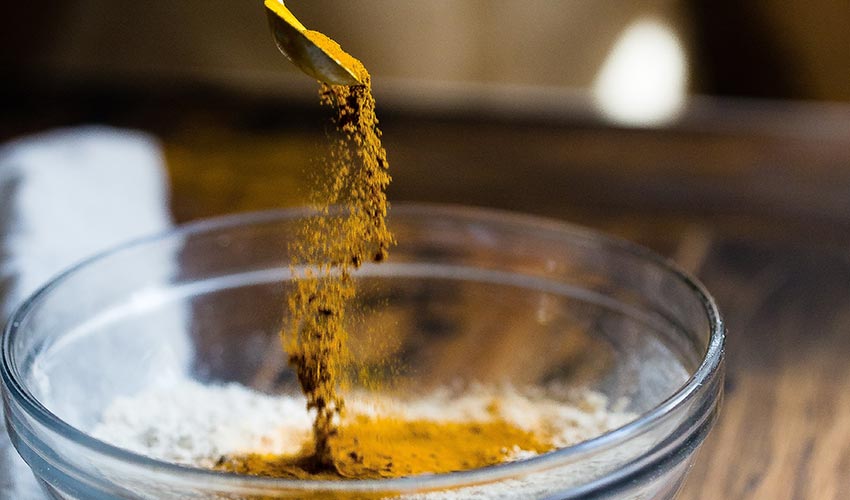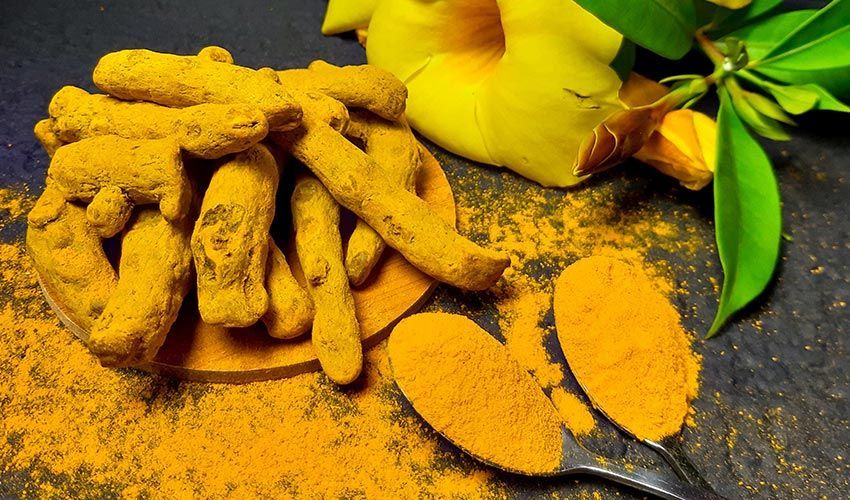Turmeric: The Wonder of Ayurveda
Let’s talk about one of my most favourite spices, which I love to eat fresh but also as a paste and in powder form. Turmeric, often referred to as the "Golden Spice," is a treasure trove of health benefits deeply rooted in Ayurvedic medicine. Widely recognised for its vibrant golden colour and warm, earthy flavour, Turmeric has been an integral part of Ayurvedic practice for centuries. This remarkable spice not only adds depth to culinary dishes but also offers a plethora of therapeutic properties that promote overall well-being. In this article, I’ll try to explore this spice’s history, uses, and health benefits as both medicine and food in Ayurveda.
Turmeric, scientifically known as Curcuma longa, originated in the Indian subcontinent over 4,000 years ago. It is a perennial plant belonging to the ginger family, widely cultivated throughout Southeast Asia. Throughout history, Turmeric has been revered for its medicinal qualities and held sacred in traditional Ayurvedic practices. In Ayurveda, Turmeric is classified as having pungent, bitter, and astringent flavours, with a heating and light quality. It is known to balance all three doshas: vata, pitta, and kapha, making it suitable for all body types. Learn more about the three doshas here.

Turmeric’s Medicinal Uses
As I said before, Turmeric is a spice that has been used for hundreds of years in traditional medicine. It is derived from the root of the Curcuma Longa plant and is commonly used in cooking to add flavour and colour to dishes. However, Turmeric also has various medicinal uses due to its active compound called curcumin. Here are some of the potential medicinal uses of Turmeric:
- Anti-Inflammatory Properties: Turmeric has strong anti-inflammatory properties and can help reduce inflammation in the body. It may be beneficial for conditions such as arthritis, inflammatory bowel disease, and other inflammatory disorders.
- Antioxidant Effects: Curcumin, the active compound in turmeric, is a powerful antioxidant. It helps neutralise free radicals in the body, which can prevent oxidative damage and reduce the risk of chronic diseases like cancer, heart disease, and Alzheimer's disease.
- Analgesic: Turmeric has been used traditionally as a natural pain reliever. It can help reduce pain and inflammation associated with issues such as osteoarthritis and rheumatoid arthritis. The typical dose used to alleviate discomfort due to inflammatory conditions such as arthritis and osteoarthritis is between 400 and 600 mg, 3 times daily.
- Digestive Health: Turmeric may aid in digestion by stimulating the production of bile, which aids in the breakdown of fats. It may also help relieve indigestion and improve symptoms of irritable bowel syndrome (IBS). Elements in Turmeric help digestion and aid your body stop overproducing the acids which cause flatulence. Try stirring one tablespoon of Turmeric powder into a glass of fruit juice when you have gas, and get rid of these unexpected gassiness sources.
- Wound Healing: The antimicrobial and anti-inflammatory properties of Turmeric make it beneficial for wound healing. Applying Turmeric paste to minor cuts and burns can help reduce pain, inflammation, and promote faster healing. Due to its high antiseptic properties, dabbing a generous quantity of powdered Turmeric on a fresh cut will aid stop the oozing of blood and prevent infections as well.
- Skin Health: Turmeric is known for its skin-soothing properties and has been used to treat various skin conditions. It may help reduce acne, scars, and inflammation, and promote a healthy complexion. Recent research indicated that Turmeric essential oil in a lotion formulation can brighten your skin within 3 weeks with results that last just as long. These glowing benefits are most-likely the result of potent antioxidants and anti-inflammatory compounds functioning together to heal and bring out your skin’s natural health.
- Brain Health: Curcumin has shown potential in improving brain function and protecting against neurodegenerative diseases like Alzheimer's disease. It may help reduce abnormal protein build-up in the brain and improve cognitive function. For promoting mental health and cognitive function, take 150 to 250 mg of Turmeric daily. Most of the Turmeric supplements will fall within this range, which is a safe and effective quantity for daily consumption.
- Heart Health: Turmeric may have positive effects on heart health by reducing inflammation, improving cholesterol levels, and reducing the risk of blood clots. Curcumin’s anti-inflammatory properties make it a perfect addition to any heart healthy diet. Fortunately, Turmeric pairs great with numerous dishes! Add one teaspoon to your plate of rice, scrambled eggs, roasted veggies, soup,, sautéed greens, and more.
While Turmeric is generally safe when consumed in moderate amounts as a spice, it is important to consult with your healthcare professional before using it for medicinal purposes or when considering higher doses of curcumin supplements. Turmeric may interact with certain medications and may not be suitable for everyone.

Harnessing the Power of Turmeric in Healthy Cooking
Turmeric, a vibrant golden spice derived from the curcuma longa plant, has been a staple in traditional medicine and culinary cultures for thousands of years. From its distinctive flavour to its vibrant colour, Turmeric offers a plethora of health benefits, making it a valuable ingredient in healthy cooking. Let’s explore the numerous ways you can incorporate Turmeric into your daily meals, unlocking its potential to enhance both taste and well-being. Turmeric contains an active compound called curcumin, which possesses potent anti-inflammatory, antioxidant, and anti-microbial properties. These properties have been linked to a range of health benefits, including improved digestion, enhanced brain function, lower risk of chronic diseases, and strengthened immune function. By incorporating Turmeric into your cooking, you can easily access these benefits.
Turmeric adds a unique flavour and brilliance to savoury dishes, making it a versatile spice in healthy cooking. It complements a variety of ingredients, such as vegetables, legumes, grains, and proteins, enhancing both taste and nutritional value. Whether you're making curries, stir-fries, soups, or roasted vegetables, a pinch or two of Turmeric can transform your dish. In addition to cooking, Turmeric can be used to create nutritious and delicious beverages. Golden milk, a popular traditional beverage, combines warmed milk with Turmeric, ginger, and other spices. It provides a soothing and comforting experience while harnessing the health benefits of Turmeric. You can also experiment with adding turmeric to smoothies, teas, and freshly squeezed juices for an extra health boost. Just be creative!

Turmeric Milk, a Traditional Ayurvedic Beverage
Turmeric Milk, also known as "haldi doodh," is a traditional Indian beverage that is made by combining Turmeric powder with milk. It is a popular drink in India and is believed to have numerous health benefits. In Indian culture, Turmeric milk is often consumed before bed as a natural remedy for various ailments. Turmeric is known for its anti-inflammatory and antioxidant properties, and it is believed to boost the immune system, aid digestion, improve skin health, and promote better sleep.
To make Turmeric milk, a person typically adds a teaspoon of turmeric powder to a glass of warm milk. Sweeteners like honey can be added to taste, and additional spices like cinnamon or ginger may also be included for added flavour and health benefits. Turmeric milk has long been a staple in Indian households, especially during the cold winter months, as it is believed to have warming properties that help fight off cold and flu symptoms. Additionally, it is often recommended for individuals with joint pain or arthritis due to its anti-inflammatory properties.
While Turmeric milk is primarily consumed for its potential health benefits, it is also enjoyed for its taste and comforting qualities. It is considered a soothing and nourishing drink, often served as a calming bedtime beverage. In recent years, turmeric milk has gained popularity worldwide, and it is now available in various forms, including Turmeric latte mixes and ready-to-drink beverages. However, in India, the traditional way of preparing Turmeric milk at home is still preferred by many, as it allows for customisation and the use of fresh ingredients.

Surprisingly, Turmeric can also be incorporated into sweet treats and baked goods. Adding a small amount to cakes, cookies, or muffins not only imparts a vibrant colour but also infuses the dish with its unique flavour. The slightly earthy and peppery notes of Turmeric can elevate the taste profile of your baked goods, making them more exciting and nutritious. To maximise the benefits and taste of Turmeric, consider combining it with other ingredients that complement its properties. For example, pairing Turmeric with black pepper increases the absorption of curcumin, enhancing its bioavailability and overall effectiveness.
Additionally, combining Turmeric with healthy fats, like extra virgin olive oil or coconut oil, aids in its absorption and assimilation in your body. Creating vibrant and flavourful dressings and sauces can greatly enhance the appeal of your healthy dishes. Incorporating turmeric into homemade dressings and sauces not only adds a rich hue but also imparts its unique taste profile. From salad dressings to dipping sauces, Turmeric can be a delightful and healthy addition.

The Golden Wonder: Why I Love Turmeric so Much
Turmeric, the vibrant yellow spice, has captivated my taste buds and health-conscious mind like no other. Its earthy aroma and distinct flavour add a delightful twist to cuisines and beverages. Beyond its culinary charm, turmeric's numerous health benefits make it an indispensable ingredient in my daily routine. Packed with antioxidants and anti-inflammatory properties, this super-food promotes overall wellbeing and boosts immunity. From soothing joint pain to improving digestion, Turmeric's versatility knows no bounds. Embracing this Golden Wonder has not only elevated my palate but also nurtured my body from within.
“I am turmeric who rose out of the ocean of milk when the devas and asuras churned for the treasures of the universe. I am turmeric who came after the nectar and before the poison and thus lie in between.” - Chitra Banerjee Divakaruni






















